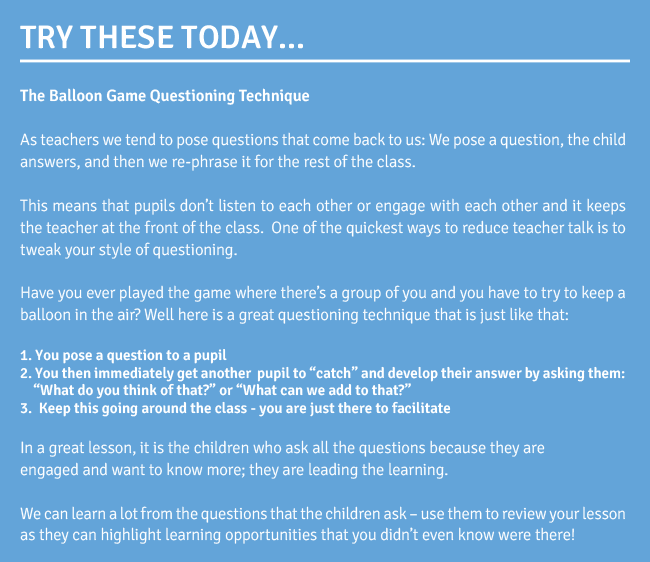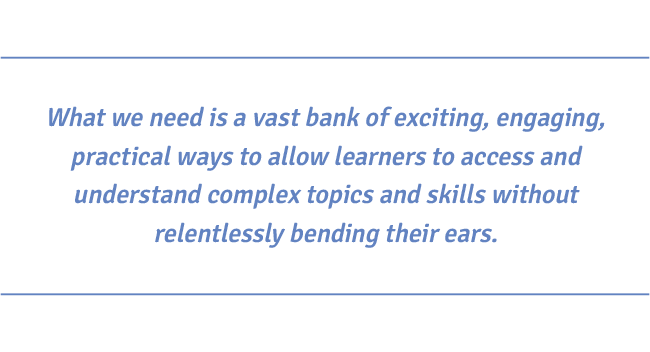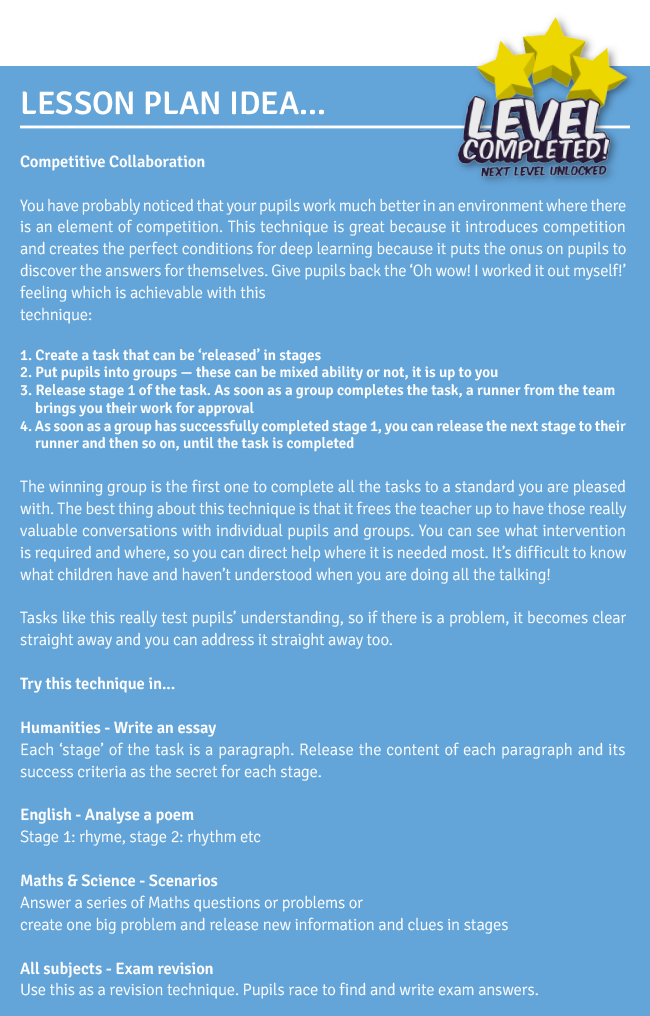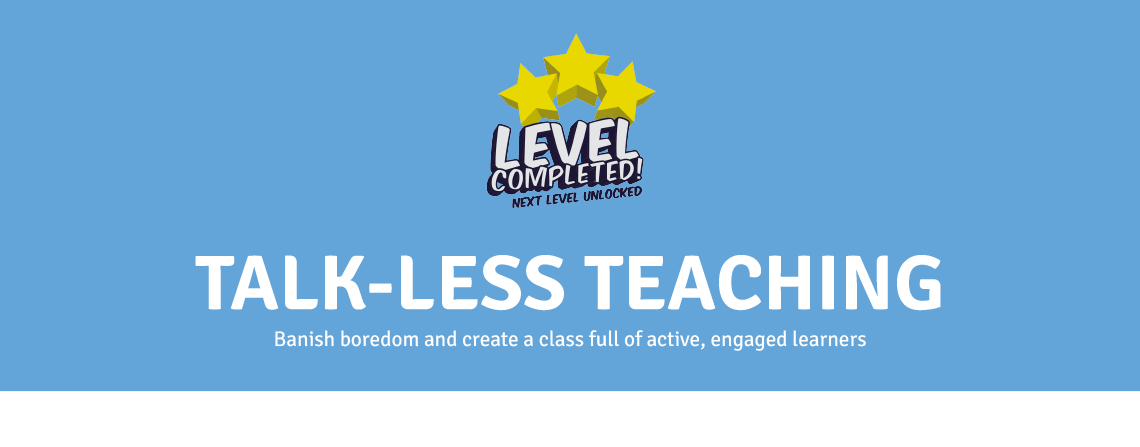Isabella Wallace answers Osiris’questions about Talk-Less Teaching, and provides you with some practical exercises to try out in your classroom today.
What inspired you to present this course for Osiris?
Was it a response to the scary rumours circulating about Ofsted?
You must mean the rumours about Ofsted
inspectors who have allegedly been told that any lesson where a teacher talks at the class for longer than 10 minutes should be deemed inadequate.
It’s actually about much more than that. Most teachers have experienced that utter sense of exhaustion that can descend at the end of a busy day in the classroom; that moment when the last pupil exits the room and we sink dejectedly into our desk-chair, nursing a sore throat. It’s a moment that should be filled with a warm feeling of satisfaction for a job well done, but often the over-riding thought that creeps naggingly into our brain is: “Hold on, did I just do almost ALL of the work back there?… Did I just bust a gut for a whole hour only to get my pupils to do a tiny bit of work?…â€
Why do you think that Ofsted are so averse to hearing ‘teacher talk?’
Research has shown that listening to someone speak is the least effective way to learn and subsequently recall information! And wait – disturbingly, research also reveals that on average, teachers talk for 80% of
lesson time!
In the light of this – and the research which shows that ‘auditory’ learning is usually the least effective method of learning – Ofsted have recently launched a significant focus on ‘Independent Learning’ and teaching in a way which encourages learning through active discussion and collaboration.
Of course, most teachers acknowledge that didactic, lecture-style teaching fosters a culture of passivity in pupils, where pupils have come to expect to have learning ‘fed’ to them – to be told the answers, rather than be taught the skills to discover the answers themselves, or even consider the possibility of alternative answers.
The commonly experienced ‘Lecture Laryngitis’ isn’t necessarily a sign of an uninspiring teacher who doesn’t care about making learning engaging and exciting; in fact it is far more likely, I believe, a symptom of that understandable fear that if we talk less in lessons, it will be impossible to get across all the vital information needed by pupils to succeed.

In your opinion why do you think teachers feel the need to talk ‘too much’?
It is a widely accepted notion that the success of pupils can be measured by their performance in standardised tests and exams, and so by extension, the competence of their teachers can be similarly assessed. When there is a whole lot of crucial content to cover, our default method for conveying information and skills to our pupils is to talk, talk and talk.
It’s a natural human instinct: what do most of us do when we’re anxious or under pressure? We talk – ten to the dozen. And let’s face it: we teachers are under huge amounts of pressure most of the time.
I have taught for 16 years, and increasingly I hear my inspirational and innovative colleagues lament the fact that they “simply do not have time to use creative or engaging teaching strategies anymore because there just isn’t room in the syllabus to ‘stop and have funâ€. There is a pervasive notion that the vast amounts of test-related information must be transferred or ‘uploaded’ from teacher to pupil, and that the best way to effect this transfer is through the power of talk. Any alternative method would be ‘stopping’ and wasting time in an already-tight schedule.
However, despite active, independent learning being an unarguably worthy concept in itself, the new focus has left many teachers feeling that they are stuck in an impossible contradiction between building independent learning skills and cramming the content necessary to get the results that Ofsted ultimately judges us on.
What is the effect of this teaching
paradox?
We are still allowing lessons to be dominated by the sound of our own voices. What we need now is to feel confident in the TRUTH that we can improve progress and performance – yes, in exams too – by using teaching techniques which allow learning to go far deeper than it does when it is mostly administered aurally!

Talk-Less teaching is all about providing teachers with realistic, practical ways to help pupils understand difficult concepts and learn new skills without making the poor dears listen incessantly to the sound of our voices; to raise attainment without resorting to formulaic, mind-numbing, teaching-to-the-test. It’s no secret that human beings learn and embed their learning most successfully by ‘doing’ and being actively involved in their learning.
We have only to take the example of learning to cook. If we had never cooked before and someone were to sit and tell us how to prepare a Sunday Roast it would be very difficult to get up and replicate what we had just heard about; even harder to remember it the next day!
However, if we were enabled to experiment, discover for ourselves what worked and what didn’t, discuss things as we went along, collaborate, watch and do, then we are likely to be able to produce increasingly tasty roast dinners for years to come!
In my Talk-Less teaching seminars with classroom practitioners, we looked at how pupils are often frustrated teachers themselves – they can devise ingenious learning activities for their peers when given half the chance.
They can be encouraged to create “how to†revision videos, give presentations, teach each other, discuss things, get actively involved and genuinely think for themselves – if we expect it of them, believe in them and persevere.
So next time those pupils look at you as if to say “Talk to the blank stare, ‘cos the brain ain’t listeningâ€, take a deep breath, remind yourself that there is another – better – way; and get the pupils to work harder than you, think harder than you, and talk harder than you.
One last question, is it ever appropriate for teacher-talk to dominate?
If we’re talking about a teacher using ‘teacher talk’ as the default way to teach then no! We know that listening to information is the hardest way to take it in and retain it.
However, there is a powerful type of teacher-talk and that’s the meaningful dialogue that happens on a one-to-one basis. SR



